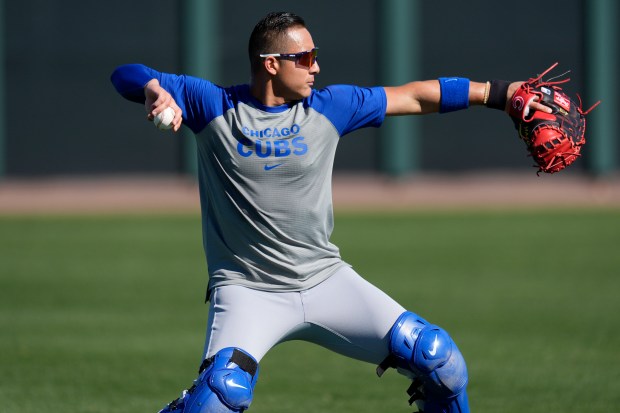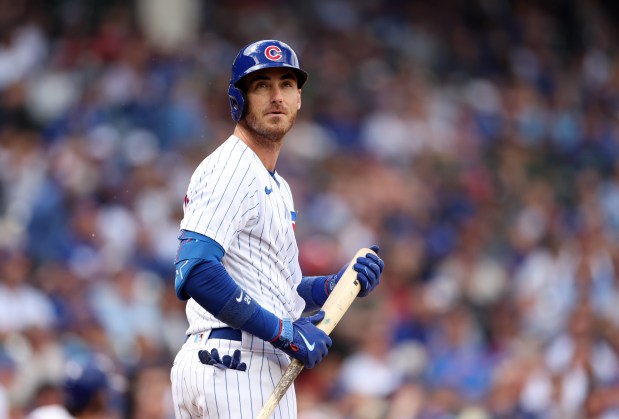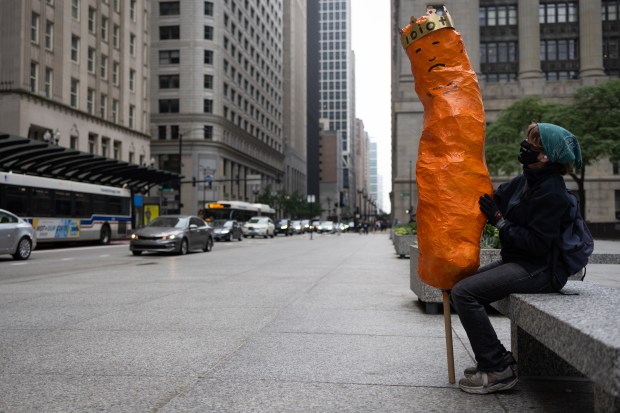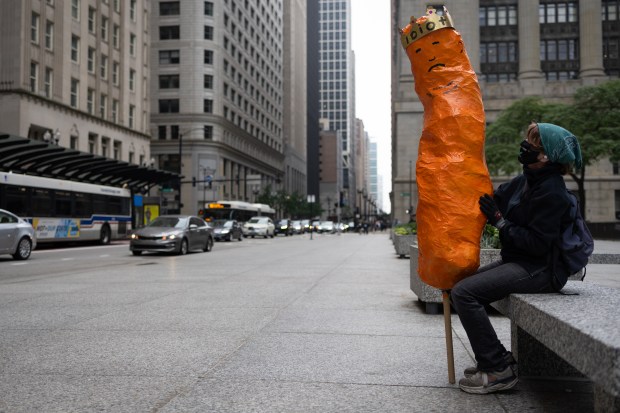MESA, Ariz. — For the last 15 years, Chicago Cubs Chairman Tom Ricketts’ speech to the team on the first full-squad workout day has remained consistent.
Treat Cubs fans like gold. Remember how much this team means to so many people.
Ricketts again conveyed that to the 59 players in big-league camp before the Cubs’ first workout Monday. Although the players in front of him remained largely the same from last season’s squad that fell a win short of the postseason, this camp represents the first opportunity for manager Craig Counsell to put his mark on the team.
Ricketts believes the Cubs “absolutely” have what they need to be better than last year and said he felt president of baseball operations Jed Hoyer had a really good offseason.
“I don’t see any reason why we wouldn’t be favored for our division this year,” Ricketts said. “Any year we don’t make the postseason is a disappointment. … Once you get to the playoffs, everybody’s got a shot. And that’s what we have to focus on, being a team that gets to the playoffs as often as possible. It has to be our No. 1 priority.”
Here are four takeaways from Ricketts’ media session after he addressed the team.
1. Ricketts doesn’t foresee the baseball budget expanding without a revenue increase.
The Cubs still have wiggle room under the collective bargaining tax threshold if they want to add to the roster.
Their projected CBT payroll is currently about $205 million, well below the initial threshold of $237 million for the 2024 season. Ricketts and Hoyer never reveal the specific figures of the annual baseball operations budget, but any decisions on how to best allocate the resources are under Hoyer’s purview.
If fans expected the Cubs to invest more in payroll over the next three years with a core group of players in place, those hopes don’t sound likely to come to fruition.
“Basically the budget is determined as we boil out the expenses effectively, so it’s not like we say, OK, now we’re going to spend a bunch and go for it or a championship window,” Ricketts said. “We’re trying to be consistent. The goal is to be one of the teams that is always trying to win the division and every year has that opportunity. I try to look at the budget much more consistently than let’s just go for it one year.”
The Cubs have previously exceeded the CBT threshold under the Ricketts family ownership. But Ricketts indicated Monday that for Hoyer’s budget to expand, the Cubs must comparably increase revenue.
“You guys can kind of forget, we do have a lot of revenue, but we pay a lot in taxes, we pay $20 million a year keeping the ballpark together,” Ricketts said. “We have a lot of expenses other teams don’t. We’re right there around CBT levels. That was kind of our natural place for us and that should be enough to win our division and be consistent every year.”
The Los Angeles Dodgers’ spending was impossible to ignore in the offseason between Shohei Ohtani’s record $700 million deal and Yoshinobu Yamamoto’s $325 million contract. Ricketts didn’t want to comment on how other teams spend, saying only that the Dodgers have a much different economic situation than any other MLB team because of their television deal.
“Their television revenues will continue to grow up into the future while everyone’s are dropping pretty quickly,” Ricketts said. “So they’re going to have that advantage going forward for a long time.”
2. Ricketts won’t get involved in any Cody Bellinger contract talks.
If Bellinger ultimately returns to the Cubs, it won’t be because Ricketts became more hands-on in contract discussions.
He made clear he won’t be connecting with Bellinger’s agent, Scott Boras, calling it “one of Scott’s signature moves” to go directly to the owner for contract talks.
“When you do that, you undermine the credibility of your general manager, so inserting yourself into that negotiation, I don’t think that helps,” Ricketts said. “So I don’t talk to him.
“We’re just waiting for whenever he and his agent are going to engage. It could be anytime now or it could be a few weeks. We’ll just see where it goes.”
As the Cubs play the waiting game, the counter to that would be a more proactive approach in which they try to make a deal happen sooner than later. Ricketts made clear that while the Cubs have had discussions with Bellinger’s side, it has not yet become a negotiation.
“So until they’re ready to really negotiate, there’s not much we can do,” Ricketts said. “You just have to wait for when it gets serious before you start talking about what the money amounts are.”
3. Hurdles remain for Wrigley Field to receive an All-Star Game.
Now that MLB Commissioner Rob Manfred announced last week that his current five-year term will be his last in the position, one of his final decisions will be to award the 2027 and 2028 All-Star games. Manfred specifically mentioned the Cubs and Toronto Blue Jays as candidates to host a game, something neither team has done since 1990 and 1991, respectively.
“With respect to those two years, I am strongly influenced by two things,” Manfred said. “One, when did you last have a game? Toronto stacks up pretty well on that variable. I think Chicago is older. … The city being willing to step up on those issues is the other big variable.”
Ricketts did not want to delve into specifics of what the Cubs and the city must do to secure a Midsummer Classic, beyond stating that the issues are all security-related.
“There’s a few things we have to work out with the city and we’ve gotten snagged,” Ricketts said. “But I think we’re getting closer. Hopefully we’ll know more pretty soon, but it’s not as simple as it looks.
“A lot of teams want the All-Star games. They are big economic drivers for the city and so they’re not easy to get. There’s some things we have to work out with it.”
4. The Cubs are seeking an ongoing balance between proven production and a path to playing time for younger players.

The Cubs could pursue multiple free-agent options whose track records of big-league production could help the team win more games in 2024.
A top-five farm system also gives the organization high-upside talent matriculating to the upper levels of the minors with some on the verge of being big-league ready. Ricketts said Hoyer must be thoughtful in how he weighs acquiring talent in free agency versus keeping pathways open for prospects to receive opportunities in the majors.
“He definitely sees that you can only spend every dollar once,” Ricketts said. “And he knows that you don’t want to have too many long-term contracts when you have a lot of young guys that are coming up through the minors.
“You want to have that flexibility … so it’s definitely something that Jed has to balance every day when he makes his personnel decisions.”





